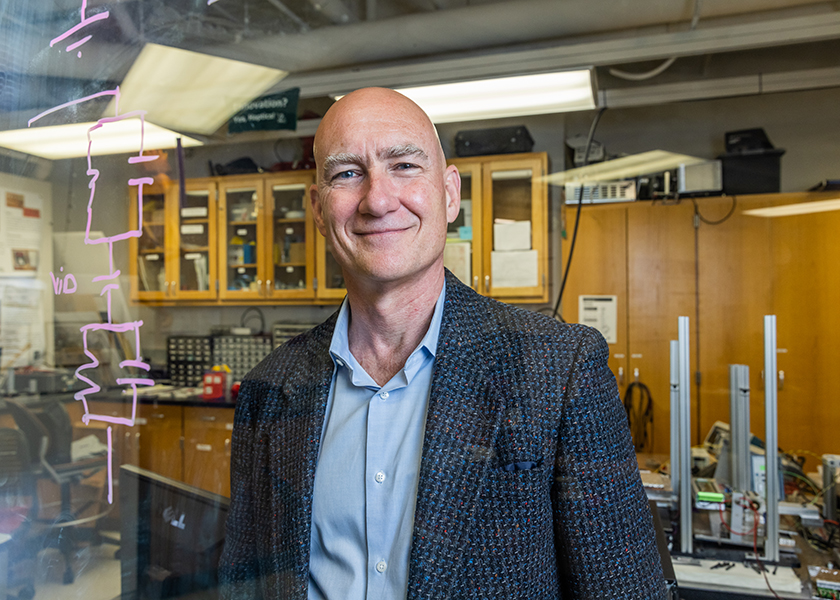New Center to Improve Robot Dexterity Selected to Receive up to $52 Million
NSF grant marks the first time Northwestern has led an Engineering Research Center
A large multi-institutional collaboration, led by Northwestern University, has received $26 million from the National Science Foundation (NSF) to launch a new Engineering Research Center (ERC) dedicated to revolutionizing the ability of robots to amplify human labor.
The NSF grant will fund the new center across five years, with the ability to renew for another $26 million for an additional five years. It marks the first ERC led by Northwestern. Core partners include Carnegie Mellon University, Florida A&M, and Texas A&M with additional faculty support from Syracuse University, the University of Wisconsin-Madison, and the Massachusetts Institute of Technology.
Called Human AugmentatioN via Dexterity (HAND), the new ERC will develop dexterous robot hands with the ability to assist humans with manufacturing, caregiving, handling precious or dangerous materials, and more. The center aims to build technological tools that are versatile and easy-to-integrate, creating robots capable of intelligent and versatile grasping, fine motor skills, and hand-eye coordination.
“This new NSF award is a historic milestone that builds on Northwestern’s well-recognized expertise in robotics and human-machine systems,” said Eric Perreault, Northwestern’s vice president for research. “The HAND proposal is bold and visionary. It will have a long-lasting, positive effect on manufacturing, food processing, healthcare and many other areas that rely on dexterous manipulation. Ed Colgate, Kevin Lynch, and their exceptional colleagues across Northwestern have built a world-class team of industrial and academic partners to ensure this cutting-edge research creates practical outcomes. I look forward to witnessing the transformative impact it will bring."
An expert in robots and haptics, J. Edward Colgate, a Walter P. Murphy Professor of Mechanical Engineering at Northwestern Engineering, will lead the center. Kevin Lynch, a professor of mechanical engineering at McCormick and director of Northwestern’s Center for Robotics and Biosystems, will serve as the center’s research director. Other Northwestern collaborators include the McCormick School of Engineering’s Brenna Argall, Jian Cao, Matthew Elwin, Elizabeth Gerber, Todd Murphey, and Ryan Truby and the School of Education and Social Policy’s Lois Trautvetter.
“Northwestern has long strived to provide national leadership in areas of the greatest societal and economic importance,” said Christopher Schuh, dean of the McCormick School of Engineering. “The HAND ERC does just that, delivering a broad innovation ecosystem, united in purpose and mission, to realize robot dexterity. I am grateful for Ed’s tremendous leadership of this initiative and am excited to see the advancement in robotics that will come from this work.”
While robots already play an important role in manufacturing and can improve workers’ job quality and raise their wages, Colgate says their full potential has been limited. Developing robotic hands that are as versatile and dexterous as human hands will enable robots to expand human capabilities and boost industry competitiveness.
“Rapid advances in artificial intelligence (AI) have created an incredible opportunity to make robot manipulators accessible to small American manufacturers, people with motor impairments and many others who might benefit,” Colgate said. “A huge challenge, however, is what we put at the end of the robot’s arm. Today’s two-jaw grippers are far too limited. HAND’s fundamental research will lead to robots with dexterous and versatile hands, manual skills, and intuitive interfaces that anyone can learn to use.”
But dexterity isn’t the new center’s only goal. The researchers also want to ensure new robotic hands are inexpensive, easy to operate without expertise, robust, durable and mass-manufacturable. As a part of the center, robotics and technology researchers will work across disciplines to engage experts in education, policy, accessibility and diversity, equity, and inclusion.

The interdisciplinary team will help develop and prepare a diverse workforce for an entirely new field of study focused on dexterous robots and foster a culture that nourishes inclusivity and ensures equitable access to new technologies. Potential outcomes will include increased worker productivity, improved job opportunities, reshoring of manufacturing, reduced supply chain vulnerability, enhanced food safety, improved quality of life, and democratization of the benefits of robotics.
Since its founding in 1985, the ERC program has supported convergent research, education and technology translation at US universities. Each ERC unites members from academia, industry and government to produce transformational engineered systems along with engineering graduates who are adept at innovation and primed for leadership in the global economy.
"NSF's Engineering Research Centers ask big questions in order to catalyze solutions with far-reaching impacts," NSF director Sethuraman Panchanathan said. "NSF Engineering Research Centers are powerhouses of discovery and innovation, bringing America's great engineering minds to bear on our toughest challenges. By collaborating with industry and training the workforce of the future, ERCs create an innovation ecosystem that can accelerate engineering innovations, producing tremendous economic and societal benefits for the nation."